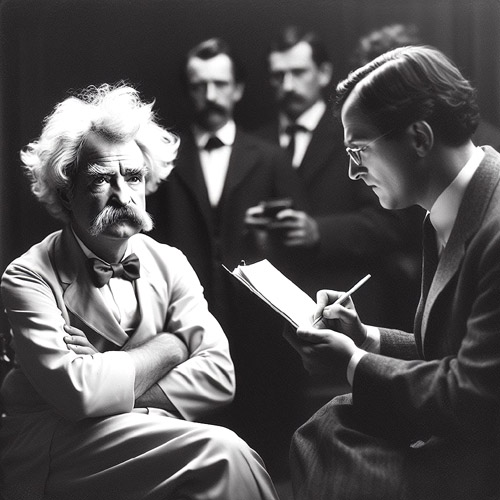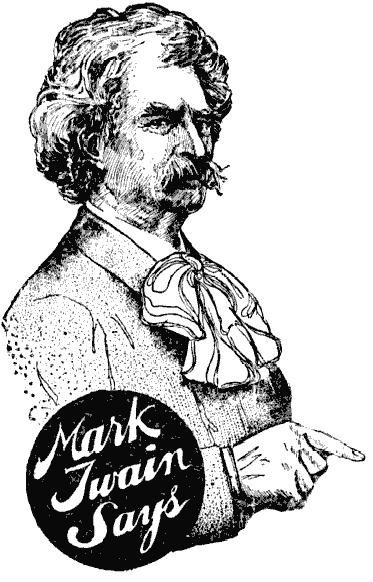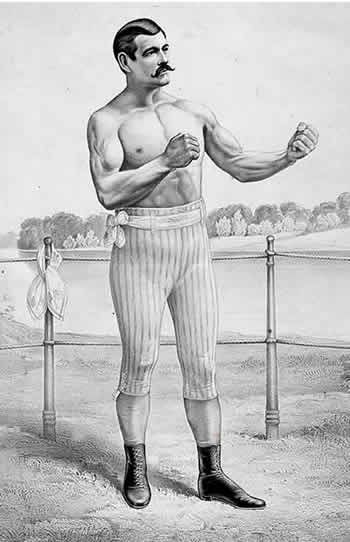

| [Sometimes] the interviewed has nothing
to say, and the interviewer does not know how to make him say it. Sometimes
in despair they write up a lot the man never said, never intended to say,
and couldn't say if he thought of it. - "Mark Twain Put to the Question," South Australian Register, 14 Oct. 1895 |
 AI image by R. Kent Rasmussen |

Mark Twain
being interviewed in bed in Vancouver
on August 18, 1895
 Graphic from advertisement in NEW YORK SUN, January 5, 1901 |
Whenever you give an interviewer a fact give him another fact that will
contradict it. Then he'll go away with a jumble that he can't use at all. People who find fault with the interviewer, do it because they do not
reflect that he is but a cyclone, after all, though disguised in the image
of God, like the rest of us; that he is not conscious of harm even when
he is dusting a continent with your remains, but only thinks he is making
things pleasant for you; and that therefore the just way to judge him
is by his intentions, not his works. I have, in my time, succeeded in writing some very poor stuff, which
I have put in pigeonholes until I realised how bad it was, and then destroyed
it. But I think the poorest article I ever wrote and destroyed was better
worth reading than any interview with me that ever was published. |
| I consider the interviewer one of the most
valuable auxiliaries of a newspaper office. ... Metaphorically put, I consider
the interviewer as the literary Sullivan of the age. You can't knock him
out. An interviewer who knows his business never takes it back, and the
frightful aspersions on his veracity, which are recklessly made by enraged
victims, are simply the noisy drivellings of a superb moral cowardice. It
is simply appalling to a sensitive mind like mine, to see the monstrous
libels that are hurled against these noble fellows, who regard with calm
but magnanimous complacency all such unfounded attacks against their probity. - "Mark Twain Interviewers / He Considers Them the Literary Sullivans of the Age," Salt Lake City Weekly Tribune, 11 Dec 1884, p. 5. |
 John L. Sullivan, United States heavyweight boxing champion from 1882 - 1892. From a Currier & Ives print from the Library of Congress Prints and Photographs Division. |
|
No, no—it is like most interviews, pure twaddle, and valueless. For several quite plain and simple reasons, an "interview" must, as a rule, be an absurdity. And chiefly for this reason: it is an attempt to use a boat on land, or a wagon on water, to speak figuratively. Spoken speech is one thing, written speech is quite another. Print is a proper vehicle for the latter, but it isn’t for the former. The moment “talk” is put into print you recognize that it is not what it was when you heard it; you perceive that an immense something has disappeared from it. That is its soul. You have nothing but a dead carcass left on your hands. Color, play of feature, the varying modulations of voice, the laugh, the smile, the informing inflections, everything that gave that body warmth, grace, friendliness, and charm, and commended it to your affection, or at least to your tolerance, is gone, and nothing is left, but a pallid, stiff and repulsive cadaver. Such is "talk," almost invariably, as you see it lying in state in an "interview." The interviewer seldom tries to tell one how a thing was said; he merely puts in the naked remark, and stops there. When one writes for print, his methods are very different. He follows forms which have but little resemblance to conversation, but they make the reader understand what the writer is trying to convey. And when the writer is making a story, and finds it necessary to report some of the talk of his characters, observe how cautiously and anxiously he goes at that risky and difficult thing "If he had dared to say that thing in my presence," said Alfred, taking a mock heroic attitude, and casting an arch glance upon the company, "blood would have flowed." "If he had dared to say that thing in my presence," said Hawkwood, with that in his eye which caused more than one heart in that guilty assemblage to quake, "blood would have flowed." "If he had dared to say that thing in my presence," said the paltry blusterer, with valor on his tongue and pallor on his lips, "blood would have flowed." So painfully aware is the novelist that naked talk in print conveys no meaning, that he loads, and often overloads, almost every utterance of his characters with explanations and interpretations. It is a loud confession that print is a poor vehicle for "talk," it is a recognition that uninterpreted talk in print would result in confusion to the reader, not instruction. Now, in your interview you have certainly been most accurate, you have set down the sentences I uttered as I said them. But you have not a word of explanation; what my manner was at several points is not indicated. Therefore, no reader can possibly know where I was in earnest and where I was joking; or whether I was joking altogether or in earnest altogether. Such a report of a conversation has no value. It can convey many meanings to the reader, but never the right one. To add interpretations which would convey the right meaning is a something which would require -- what? An art so high and fine and difficult that no possessor of it would ever be allowed to waste it on interviews. No; spare the reader and spare me; leave the whole interview out; it is rubbish. I wouldn’t talk in my sleep if I couldn’t talk better than that. If you wish to print anything print this letter; it may have some value, for it may explain to a reader here and there why it is that in interviews as a rule men seem to talk like anybody but themselves. Very sincerely yours, - letter to Edward Bok, circa 7 July 1889 |
Also see: "Concerning
the Interview" --
A Newly Published Mark Twain Essay from the PBS website posted July 7, 2010
_____
Also see: Comprehensive List of Known Interviews
Quotations | Newspaper Articles | Special Features | Links | Search